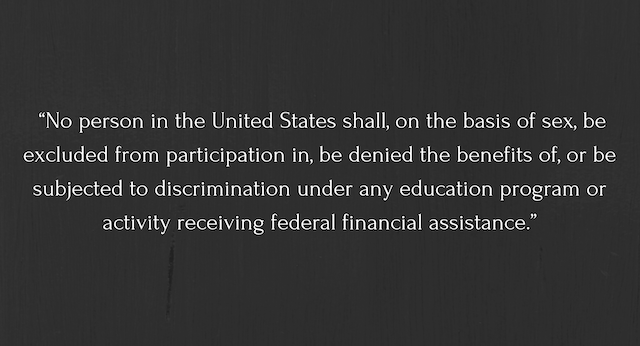Title IX at Texas Tech
Click links below for more information:
- Report a Title IX Incident
- What is Title IX?
- Sex-Based Discrimination
- What is Consent?
- When Should I File a Report?
- How Can We Help You?
- What Happens When I Report an Incident?
- What is the Formal Grievance Process?
What is Title IX?

Title IX is a federal law that prohibits discrimination on the basis of sex in any educational program or activity.
Texas Tech University does not tolerate discrimination or harassment based on or related to:
- Sex
- Race
- Ethnicity
- Religion
- Spirituality
- Ability Status
- Protected Veteran Status
Sex-Based Discrimination Includes:
- Sexual Harassment
- Sexual Assault
- Sexual Misconduct
- Interpersonal Violence
- Stalking
- Discrimination or Harassment based on Gender
- Pregnancy, Nursing, and Parenting Discrimination
University policy defines consent, sex discrimination, and sexual misconduct behaviors that are prohibited. To read how the University defines these behaviors, please see Section D of the Student Code of Conduct.
Even if your experiences do not exactly meet the policy definition, we can still provide Supportive Measures and Resources to assist you!
What is Consent?
Texas Tech University defines consent as mutually understandable words or actions, actively communicated both knowingly and voluntarily, that clearly conveys permission for a specific activity.
- Consent is not effective if it results from:
- The use of physical force
- A threat of physical force
- Intimidation
- Coercion
- Incapacitation
- Or any other factor that would eliminate an individual’s ability to exercise their own free will to choose whether or not to engage in sexual activity.
- Before engaging in any type of sexual activity, it is the initiator’s responsibility to obtain their partner’s consent, either verbally or non-verbally.
- Silence cannot be assumed to express consent, and saying “NO” is not the only way a sexual partner
may communicate a lack of consent. A partner may use non-verbal cues to indicate their
lack of consent for any sexual activity. Some examples of non-verbal communication
that demonstrate lack of consent include:
- Resistance: pushing hands away, pulling away from partner
- Body going limp or freezing up
- Crying
- Wincing
- Other points regarding consent:
- A person is not required to actively resist their aggressor.
- A person’s intentional use of alcohol/drugs neither negates nor diminishes the initiator’s responsibility to acquire consent before engaging in sexual activity.
- Consent has an expiration date. Consent on Thursday does not mean consent on Friday.
- A prior existing sexual relationship between consenting adults does not imply future consent to engage in sexual activities. This is true even in marriage or other long-term sexual relationships.
- A person CANNOT consent to sexual activity when they are incapacitated. Engaging in sexual activity with someone you know or reasonably should know is incapacitated is a violation of this policy. The question of what the Respondent should have known is objectively based on what a reasonable person would have known about the condition of the Complainant.
- Revocation of Consent
- One partner can revoke their consent at any time, so long as it’s clearly communicated to the other partner. Revocation may be communicated verbally and/or non- verbally. Once a partner has revoked consent, the sexual activity must stop. If sexual activity continues after the other partner has revoked their consent, a sexual assault has occurred.
When Should I File a Report?
- An incident has negatively affected your academics, employment, or student involvement.
- You have concerns about your safety or the safety of others.
- You need assistance and support, but you do not want to disclose details or names.
- You would like a No Contact Order to prohibit communication between you and another party.
- You would like the University to facilitate an informal resolution or investigate the incident.
How Can We Help You?
- Provide Supportive Measures and Resources
- Emotional support after an incident
- Academic Support
- Course load reductions, withdrawals, absence notifications, requests for flexibility/alternative participation to faculty or supervisors
- Housing Assistance
- Short-term emergency housing accommodations or housing changes
- Medical Services
- Counseling Services
- Extracurricular and Student Organization Assistance
- Altering Student Employment Schedules
- Parking Assistance
- Safety Plan
- No Contact Orders
- Support and referrals for concerned friends, family, partners, and faculty/staff members
- See Supportive Measures Page for information regarding on-campus, community, and national resources
- Stop behavior from continuing or escalating
- Provide education and prevention
- Facilitate Informal Resolutions
- Investigate incidents to pursue a potential disciplinary outcome
What Happens When I Report an Incident?
- The Title IX Case Management Team reviews the report
- A member of the Case Management Team sends an email to the involved student to create an individualized support plan and discuss different options available
- The student decides if they would like to file a Formal Complaint to begin the University Grievance Process
The Title IX process is Complainant driven, meaning the student who is reporting the incident gets to determine how they would like the University to intervene.
View the Texas Tech University Sexual Misconduct Process Flow Chart
What is the Formal Grievance Process?
- Complainants may choose to participate in the Formal Grievance Process by Filing a Formal Complaint
- A University Administrative Investigator meets with the Complainant
- A Notice of Formal Complaint is sent to the Complainant and Respondent
- Complainants and Respondents provide statements, evidence, and a witness list to an investigator
- The Investigator conducts a thorough investigation and compiles an Investigative Report
- A disciplinary hearing will decide responsibility and accompanying sanctions
View the Texas Tech University Sexual Misconduct Process Flow Chart
Title IX
-
Address
Doak Hall 129, Lubbock, TX, 79409 -
Phone
806.742.7233 -
Email
titleix@ttu.edu -
Instagram
@ttutitleix

